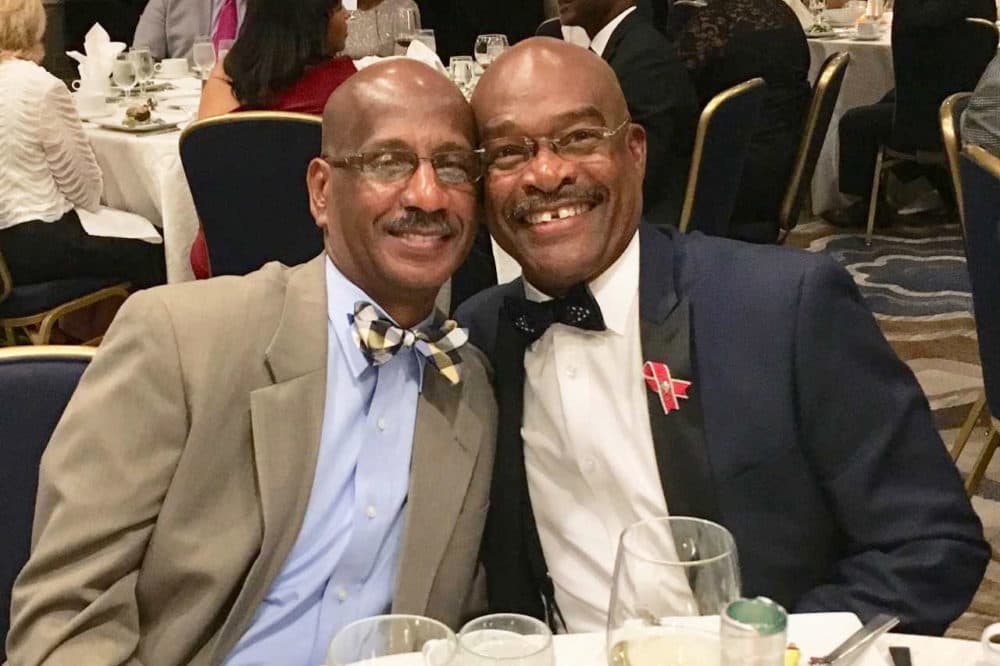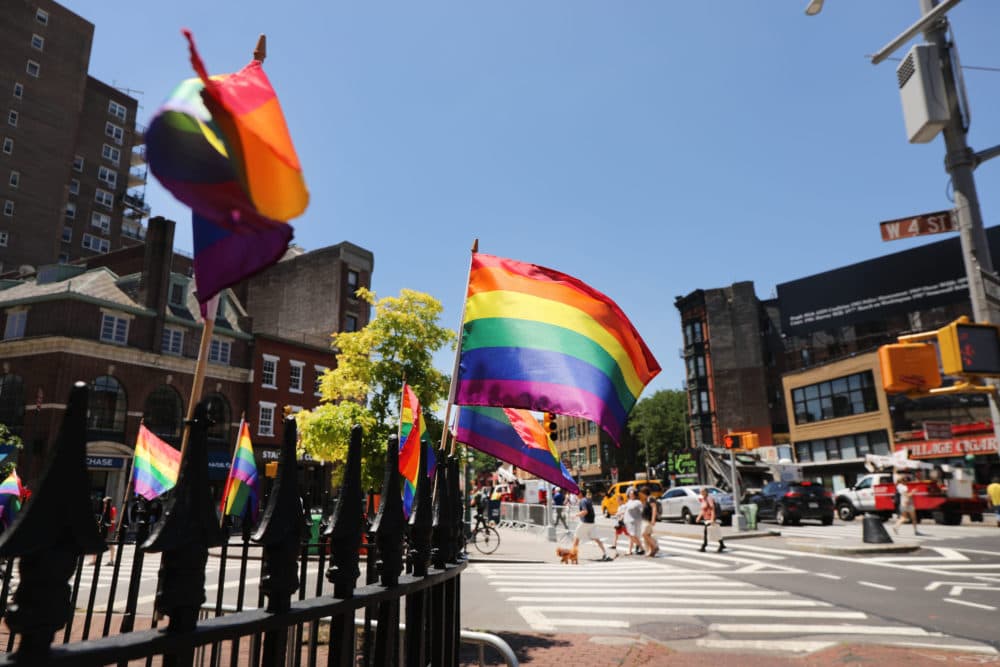Advertisement
They Were Both At The Stonewall Riots, But Separately. Now They're Married

Fifty years ago on Friday, a police raid on a New York City gay bar called the Stonewall Inn led to riots that have become synonymous with the start of the LGBTQ rights movement.
Paul Glass and Charles Evans — now married — were both there separately when the riots broke out in 1969. But they didn't know it until recently.
Glass was a teenager living in Boston at the time, and decided to take a trip to New York to explore "more of what the gay life had to offer" in Greenwich Village. He and Evans, both African American, had met the previous year and dated long distance. Things didn't work out.
"I kind of sneaked in town without telling him," Glass says. "I was on the opposite end of Christopher Street down near the piers and was working my way back up towards Sheridan Square when folks were kind of running down the street and sending out word almost like the town crier that there was a commotion going on up in Sheridan Square, so everybody kind of ran in that direction."
Evans was coming from a club on the opposite end of Christopher Street, Glass says, "so we never really saw one another." Both men tell Here & Now they weren't afraid as the riots unfolded. They say they were accustomed to police raids on gay clubs in the city, and that they remember feeling power in numbers.
New York City's police commissioner recently apologized for the raid on behalf of the department.
Evans and Glass eventually reconnected and got together for good. Now, as the country commemorates the riots' 50th anniversary, Glass says he remembers them for the way LGBTQ people stepped up and forcefully fought back against oppression.

"It was one of the first times that the gays ... felt as though they were no longer subhuman. They felt that they should be respected, and they had rights," Glass says. "For a long time, certainly from my perspective, being the time that I had been out in gay life, the attitude was pretty much you didn't have any rights. So you just had to go along and comply with whatever was the order of the day."
"Folks began to feel as though when they come together, they had power, and that power was evident at Stonewall," he says.
Interview Highlights
On being in New York when the riots took place
Charles Evans: "I was raised down South by my aunt, so I was up visiting my parents for the summer, and as usual, you just hang out. It was one of those days I wanted to go out, and I ended up going to the Village, and there was this club called the Bon Soir that I would always frequent. And then it just happened to be that Friday after leaving the club, I came down West 4th Street, and as I approached West 4th Street, I saw a crowd. Normally after we left the club, we always go to Sheridan Square and just hang out, because young kids — like I said I was … between my freshman and sophomore year in college — so we just went to hang out. And as we get close to Sheridan Square, we saw this crowd.
"And next thing we knew, we were joining into the crowd. Now to others, it was kind of interesting because I was still in a riot mode, because the month before we had had a big riot at my college. And I guess by getting into this crowd, it just made the adrenaline even higher. And the next thing I know, it's 50 years later and here we are."
Advertisement
On if they felt worried for their safety
Evans: "I didn't even think about that, because when by the time we got there, I guess all the screaming and the hollering, and then we kind of found out what was going on. So we kind of joined in, and it got to be the point to if you had lived in New York during that time and going to the clubs, you would be in the club, and then all at once the music would stop. They would unplug the jukebox and the cops would come and they would walk around. So it got be a point [where] you were tired of being tired. So when we found out exactly what was going on, we felt good. So there was no danger, I felt. No danger at all."
"[The] next thing we knew, we were joining into the crowd."
Charles Evans
Paul Glass: "I didn't feel so much in danger because I felt we had numbers, and it wasn't the kind of commotion, if you will, from the police. They were being resistant or pushing back, but they really weren't being as violent as I have seen them in other situations. I think they were more afraid of the crowd than the crowd was afraid of them. And they really were moving in reverse when they were being pelted with things that were being thrown at them. So I felt that there was some safety from that perspective."
On whether the riots felt monumental and historic at the time
Glass: "It felt monumental, but I didn't feel the historic part until later."
Evans: "I saw it in so many different ways. Being black and born in the South, this was just another time of fighting resistance. So it was just an uprising that I felt that was part of my nature to fight for my rights. So … talking about monumental, it was just another step forward for my rights. And this time not being as my racial rights, it's my equality rights. It's being a gay person."
On whether younger generations of LGBTQ people in the U.S. understand what happened at Stonewall and its impact
Evans: "No. I look back [at] when they were interviewing a young lady at the Boston Pride, and they asked her, 'What was Stonewall all about?' And she had the slightest idea. She even turned to her friends and said, 'Could you help me out?' So we are talking 50 years later, and it seemed like it was out of sight, out of mind to a lot of the young kids. And that's why I think it's so important for us older LGBTQ to try to communicate to these kids and let them understand the importance of it, because sometimes I think they just live for today."
Glass: "There's a generation that has lost some of the rich history about Stonewall and a lot of the activism that happened post-Stonewall as well. There's a whole generation that just wasn't born around that time, so they're not in tune to all the rights that they have, that they enjoy now, that they are living on the backs of those who were part of that initial uprising and those who have carried the banner since then."
On how they found their way back to one another
Evans: "That's a rich story, and I'll try to give the short version. I was living in New York. After 9/11, I left New York after 30 years and moved back to Massachusetts ... where I had purchased a home. And it was not long after, it was a friend of mine who passed away and a mutual friend came to the funeral. We were very close at the time, but he was still living in New York. ... And we hadn't been in communication. We exchanged information.
"The next weekend he runs into Charles, and Charles and I at that point had a 12-year absence, and we hadn't been in communication, hadn't seen or spoken to one another. He gave Charles my number. He gave me Charles' number. I called him. It looked like ... there was a little bit of a spark. I invited him to come to the Cape. He came and it was on since then, and two years later, we got married. And that was seven years ago."
Ashley Locke produced this interview and edited it for broadcast with Todd Mundt. Jack Mitchell adapted it for the web.
This segment aired on June 27, 2019.
